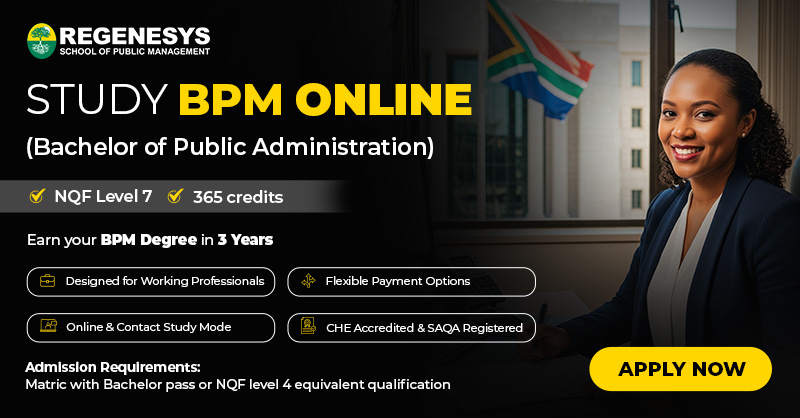Public Policy Analysis & Evaluation is one of the most impactful areas of study within business and governance education. It gives students the knowledge and skills to critically examine government policies, understand their effectiveness, and recommend improvements. As South Africa faces pressing social and economic challenges, the demand for professionals skilled in this area continues to grow. The public policy specialisation within BPM in SA helps learners strengthen their analytical abilities while preparing them for diverse policymaking careers in the public, private, and non-profit sectors.
In this article, we will explore more about the public policy specialisation within BPM in SA, focusing on the career opportunities, skills acquired, policy project examples, and much more.
Table of Contents
- What Is Public Policy Analysis & Evaluation?
- Why does Public Policy Specialisation within BPM in SA Matter?
- Course Structure of Public Policy Specialisation within BPM in SA
- South African Governance Focus
- Skills Acquired Through Public Policy Specialisation within BPM in SA
- Careers and Job Roles in Policymaking
- Example Policy Projects Covered
- Importance of Evaluation Tools in Policy Analysis
- Common Confusions Clarified
- How does Public Policy Specialisation within BPM in SA Prepare You?
- Conclusion
- Public policy specialisation within BPM in SA – FAQ
Choosing the right BPM programme matters, and our Bachelor of Public Management (BPM) courses at Regenesys are designed to help future leaders build a strong foundation for success. Enrol Now!
What Is Public Policy Analysis & Evaluation?
Public Policy Analysis & Evaluation focuses on the systematic study of government decision-making. It examines how policies are developed, implemented, and assessed to ensure they achieve the intended outcomes. For students enrolled in a public policy specialisation of BPM in SA, this subject provides both theoretical foundations and practical case studies to understand governance.
At Regenesys School of Public Management, public policy is one of the core modules included in the Bachelor of Public Management (BPM) programme. The BPM is a three-year undergraduate degree (NQF Level 7, 365 credits, SAQA ID 97259) that equips learners with the knowledge and practical skills to succeed in public and development sectors, available in both online and contact study modes.
The Regenesys public policy module is introduced across Year 1, Year 2, and Year 3 of the BPM, ensuring progressive development of expertise in public policy management. This means that learners start by gaining an understanding of the fundamentals of policymaking and governance, and gradually build advanced analytical and evaluative skills.

Why does Public Policy Specialisation within BPM in SA Matter?
Many students are uncertain about what differentiates a public policy specialisation within BPM in SA from broader governance or management studies. The distinction lies in its emphasis on structured evaluation and policy effectiveness.
This area is especially significant in the South African context, where public policy in SA must balance constitutional values, economic development, and social justice. By studying this subject, students not only prepare for policymaking careers but also gain the ability to engage in constructive debates about service delivery, accountability, and governance.
Here are some of the key reasons why this specialisation is highly relevant today:
- Growing complexity of governance: Public policies now deal with multifaceted challenges such as energy security, climate change, and inequality.
- High demand for skilled professionals: Analysts trained in government policy analysis are sought after by both state and non-state organisations.
- Practical learning: With exposure to real-world case studies, students understand how policies are shaped and challenged in South Africa.
Read more on The Future of Public Management (BPM) Education: Trends to Watch here!
Course Structure of Public Policy Specialisation within BPM in SA
The course structure helps students build a comprehensive understanding of both policy analysis and evaluation. It is designed to move from theory to practice, ensuring that learners can apply their knowledge to real governance issues.
The following components are typically covered in a public policy specialisation within BPM in SA:
- Core concepts of policy analysis: Students learn the fundamentals of the policy cycle – agenda-setting, formulation, implementation, and evaluation. These concepts lay the groundwork for advanced topics.
- Methodologies for evaluation: Learners are introduced to quantitative and qualitative evaluation tools. This includes cost-benefit analysis, social impact assessments, and programme monitoring.
- Applied case studies: Through South African and international examples, students gain insights into successes and failures of policies. This applied learning is crucial for developing practical judgment.
- Research and academic writing: A strong emphasis is placed on policy research skills, data interpretation, and report writing, which are all vital for policy professionals.
Read on Exploring the Different Levels of Public Management Qualifications in South Africa here!

South African Governance Focus
In South Africa, policy decisions are deeply tied to the country’s history, constitutional framework, and developmental priorities. A public policy specialisation within BPM in SA, therefore, has a strong focus on the governance challenges unique to the region.
Students learn about pressing issues in public policy in SA, including unemployment, inequality, land reform, education, and healthcare. They also explore the institutional environment – from Parliament and Cabinet to local municipalities – where decisions are debated and implemented.
Some of the South African governance themes covered include:
- Constitutional values: Understanding how policies must align with the Constitution, human rights, and democratic governance.
- Public sector accountability: Examining mechanisms such as the Auditor-General and Public Protector in enforcing accountability.
- Service delivery challenges: Studying policies related to housing, sanitation, and water supply, which remain urgent national priorities.
- Economic growth policies: Analysing fiscal and industrial strategies to address unemployment and inequality.
Skills Acquired Through Public Policy Specialisation within BPM in SA
One of the biggest strengths of the public policy specialisation within BPM in SA is the practical skill set it offers. These skills prepare students for a wide variety of roles across government, non-profit, and international organisations.
Here are the skills most commonly acquired:
- Policy design and formulation: Students learn how to structure effective public policies, keeping in mind both political feasibility and social impact.
- Critical thinking and evaluation: Training with evaluation tools sharpens analytical skills, allowing students to judge whether policies are effective or need reform.
- Stakeholder engagement: Since policies affect multiple stakeholders, learners practise how to communicate and negotiate with diverse groups.
- Research and presentation skills: Strong emphasis is placed on academic writing, report structuring, and presenting findings clearly to decision-makers.
- Strategic decision-making: Students gain the ability to analyse complex situations and propose actionable recommendations.
Know What Is Public Management Degree? Admission Requirements and Programme Overview here!
Careers and Job Roles in Policymaking
Completing a public policy specialisation within BPM in SA opens doors to a wide range of professional roles. These careers are not limited to government but extend across NGOs, think tanks, and international organisations.
Here are some examples of policymaking careers available to graduates:
- Policy Analyst: Works with data, reports, and research to evaluate current policies and recommend changes.
- Public Sector Consultant: Advises government departments or municipalities on best practices and innovative solutions.
- NGO Programme Manager: Focuses on developing and evaluating programmes in social development, health, or education sectors.
- Government Researcher: Provides evidence-based research that supports new policy proposals or reforms.
- International Development Advisor: Works with global organisations to align South Africa’s policies with international frameworks such as the SDGs.
Know What You Can Do with a Public Management Degree : Career Opportunities and Skills here!
Example Policy Projects Covered
Policy projects help students connect theory with practice. Within the public policy specialisation of BPM in SA, learners examine both historical and current policies to sharpen their evaluation skills. Some notable examples of policy projects include:
- Land Reform Policy: Analysing land redistribution strategies and their social and economic implications.
- National Health Insurance (NHI): Studying the proposed reforms in healthcare financing and their feasibility.
- Energy and Climate Policy: Examining South Africa’s energy transition, Eskom restructuring, and climate commitments.
- Social Protection Policies: Reviewing grants and welfare programmes aimed at reducing poverty and inequality.
These projects not only teach the application of government policy analysis but also highlight how complex policy outcomes can be.
Importance of Evaluation Tools in Policy Analysis
Evaluation is central to policymaking because it determines whether government interventions achieve their objectives. Within the public policy specialisation of BPM in SA, students gain exposure to a wide range of evaluation tools.
Some of the key evaluation tools explored include:
- Cost-Benefit Analysis: Compares the costs of a policy against its expected benefits to judge efficiency.
- Impact Assessments: Measures long-term social and economic effects of a policy.
- Monitoring and Evaluation Frameworks: Tracks progress during policy implementation to ensure alignment with goals.
- Benchmarking: Compares South African policies with international best practices to identify areas for improvement.
Common Confusions Clarified
Public Policy Analysis & Evaluation is often misunderstood. Many learners assume it is purely academic or closely tied to political science. In reality, it is an applied subject that directly prepares students for professional practice.
Here are some common confusions clarified:
- Policy analysis vs. policy evaluation: Analysis is about designing and structuring policies, while evaluation is about assessing their effectiveness. Both are covered within the module.
- Public policy vs. politics: Public policy deals with structured solutions to social problems, while politics is about power and representation.
- Theory vs. practice: While theory is covered, the public policy module emphasises practical application, especially through projects and case studies.
How does Public Policy Specialisation within BPM in SA Prepare You?
South Africa’s governance landscape is evolving rapidly, and there is a constant need for professionals with strong policy evaluation skills. The public policy specialisation within BPM in SA prepares learners to be adaptable and solutions-oriented in such environments.
This preparation is future-focused in the following ways:
- Alignment with national priorities: The subject aligns with the National Development Plan (NDP) and other key frameworks.
- Global relevance: While the focus is on South Africa, lessons can be applied to global challenges such as climate change and inequality.
- Lifelong career value: With demand for policymaking careers increasing, these skills remain highly marketable across industries.
Read on Is a Bachelor of Public Management in Demand in South Africa? here!

Conclusion
Public Policy Analysis & Evaluation is not only an academic subject but also a professional gateway into governance, analysis, and reform. A public policy specialisation within BPM in SA helps students acquire critical skills, explore real-world projects, and pursue impactful policymaking careers in South Africa. Equipping learners with both knowledge and tools ensures they can actively contribute to shaping the country’s future.
For those considering the BPM programme from Regenesys School of Public Management, it is important to note that the October 2025 intake at Regenesys Business School is open only for the online BPM programme. The registration deadline for this intake is 29 September 2025. If you are interested in studying public policy, this is an excellent opportunity to enrol.
Apply today and take the first step towards building a meaningful career in public service and governance!
Public policy specialisation within BPM in SA – FAQ
What is Public Policy Analysis & Evaluation in BPM?
It is a study area that focuses on how policies are designed, implemented, and assessed to ensure they achieve intended outcomes.
How does the Regenesys public policy module add value?
It blends theoretical concepts with applied learning, ensuring students can use evaluation tools in real-world policy environments.
What are the most common policymaking careers after completing this subject?
Graduates can work as policy analysts, consultants, researchers, NGO managers, or advisors in government and international organisations.
Which evaluation tools are taught in this subject?
Students learn methods such as cost-benefit analysis, impact assessments, monitoring frameworks, and benchmarking.
How relevant is this subject to public policy in SA?
It is highly relevant, as it directly addresses challenges in South African governance such as inequality, unemployment, and service delivery.
Can this module help me work in both government and NGO sectors?
Yes, the skills acquired are versatile and can be applied in public, private, and non-profit organisations.







